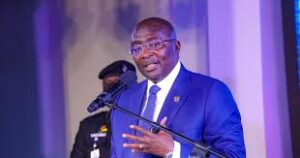Bawumia Dismisses Claims That Religion Influenced NPP’s 2024 Election Defeat

Dr. Mahamudu Bawumia, the New Patriotic Party’s (NPP) presidential candidate for the 2024 general elections and former Vice President of Ghana, has dismissed suggestions that the party’s loss at the polls was due to his religious identity as a Muslim. Speaking at the NPP’s national headquarters in Accra ahead of a planned thanksgiving tour, Dr. Bawumia strongly condemned the claims as baseless and divisive.
Addressing a gathering of party members and media, Dr. Bawumia labeled the allegations as “propaganda” that does not reflect the inclusive political culture Ghana has cultivated over the years. He argued that the data from the elections—and from within the party itself—clearly disproves the notion that religion played any significant role in the NPP’s electoral outcome.
“There have been claims making the rounds that we lost the election because I am a Muslim,” Bawumia stated. “But when I heard that, my first reaction was disbelief. That is not the Ghana I know. Ghana is a country where people vote based on vision, performance, and character—not on whether a candidate is Muslim or Christian.”
He further explained that his victory during the party’s internal primaries offered the clearest evidence that religious affiliation was not a determining factor for support. Out of ten aspirants for the NPP’s flagbearer position, he was the only Muslim, yet party delegates overwhelmingly chose him to lead them into the national elections.
“That alone tells you that our party is forward-thinking and mature. If religion mattered so much, how would I have been selected among nine other Christian contenders?” he questioned.
To substantiate his claims, Dr. Bawumia shared results from his own post-election analysis, which indicated that he outperformed several of the party’s Christian parliamentary candidates in numerous constituencies across the country. This, he said, clearly debunks the idea that voters rejected him on religious grounds.
He cited the case of Assin South in the Central Region, where he secured more votes than the NPP parliamentary candidate, Reverend John Ntim Fordjour—a prominent Christian figure and clergyman. “Rev. Ntim Fordjour is a well-known pastor, yet I received more votes than him in his own constituency. He worked tirelessly for the campaign, and I’m grateful for his support,” Bawumia added.
Moreover, Dr. Bawumia pointed to various independent surveys and research conducted following the 2024 elections. These studies, according to him, consistently showed that neither religion nor ethnicity significantly influenced voting behavior. Instead, economic concerns, governance issues, and policy direction were the primary factors that swayed voters.
“All credible research after the elections has ruled out religion and tribalism as reasons for our defeat,” he stressed. “We must not allow such narratives to take root in our national conversation.”
He cautioned against the spread of identity-based political narratives, warning that such divisions could erode the unity Ghana has long maintained across ethnic and religious lines. “We are one people with a shared future. Whether Muslim or Christian, our common interest should always be Ghana’s progress,” he said.
Dr. Bawumia concluded by calling on Ghanaians and political leaders to uphold the values of tolerance, unity, and mutual respect. He emphasized that the strength of the nation lies in its ability to transcend religious and ethnic boundaries in pursuit of development and prosperity.
The NPP’s upcoming nationwide thanksgiving tour is expected to reconnect the party leadership with grassroots supporters, provide a platform for reflection, and lay the foundation for internal renewal and strategic planning ahead of future elections.
In his remarks, Bawumia reinforced his commitment to the party and the nation, expressing optimism about Ghana’s democratic future and the need to focus on shared goals rather than identity-based divisions.






